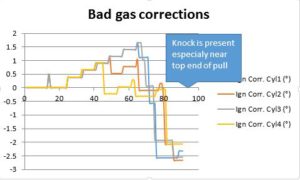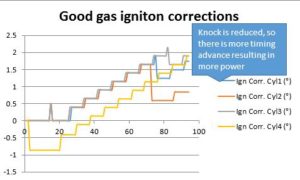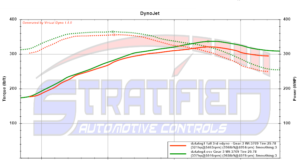It happens. You are travelling, you don’t use your regular gas station, they change the fuel quality in your area. So now you are stuck with a bad tank of gas (and what I mean by this is fuel with lower actual octane than what you usually use) in your pride and joy and your heart sinks at the thought. Here’s what that looks like, means, and how to address it.
First of all, keep in mind that your car has modern reactive knock sensors and these will pick up the knock from the poorer gas and pull back timing to keep the engine safe. This applies to all modern vehicle platforms. On an Ecoboost for example, the car will LEARN the fuel octane you are using. The OAR (octane adjust ratio) parameter is used to do this. It will adjust closer to positive 1 and timing will be pulled preemptively from the tune to prevent the knock from occurring.
The engine won’t all of a sudden explode because of knock from a bad tank of gas if the tune is setup to make use of these safety features. It is not ideal, and if the fuel quality in your area has permanently changed you should have the tune adjusted. However, this NON-LSPI poor fuel quality knock can be handled quite well by the knock sensors to ensure engine safety.
Keeping an eye on your datalogs and live monitors will tell you if something is out of the norm. Here’s how our 3rd gear pull corrections look like with a bad tank of gas.
 You can see that the timing additions in this 3rd gear pull stop after adding about 1.5* and then drop due to knock ending up in the -2.5* region.
You can see that the timing additions in this 3rd gear pull stop after adding about 1.5* and then drop due to knock ending up in the -2.5* region.
Here’s how our usual “good gas” behaves. These pulls are taken on the same road, same modifications, and same temperatures but with better fuel.
Notice that there are much fewer “drops” as the ECU is adding timing during the pull. Most cylinders are adding 1.5-2* near the end of the pull instead of pulling -2.5*.
Aside from the engine safety concern, this loss of timing advance does hurt performance. How much? In the case of our Focus RS the timing difference is worth a solid 16whp and 10 ftlb of torque. A ballpark figure is that 1* of timing accounts for around 3whp on the Ecoboost 2.0 and 2.3 engines.
So what can be done if you run into bad gas? Here are some tips:
- Wait it out if you know it’s a poor tank. Unless the gas is VERY bad the car will rely on its sensors to adjust timing dynamically. If you are seeing consistent corrections take it a bit easier until the tank runs out.
- Run a low boost map – we include this with all of our tunes.
- Add some octane booster to the tank. A bottle of the over the counter stuff will make a 2-4* timing advance difference. More expensive Race Gas or Boostane brands will have a bigger impact but they can’t be found everywhere.
- Add 1-2 gallons of E85 to the tank and top up with premium. Adding a splash of E85 increase the octane enough to ride a bad tank out and does not require a tune change.
- If you are consistently seeing “bad gas” in your area, consider having the tune adjusted.


